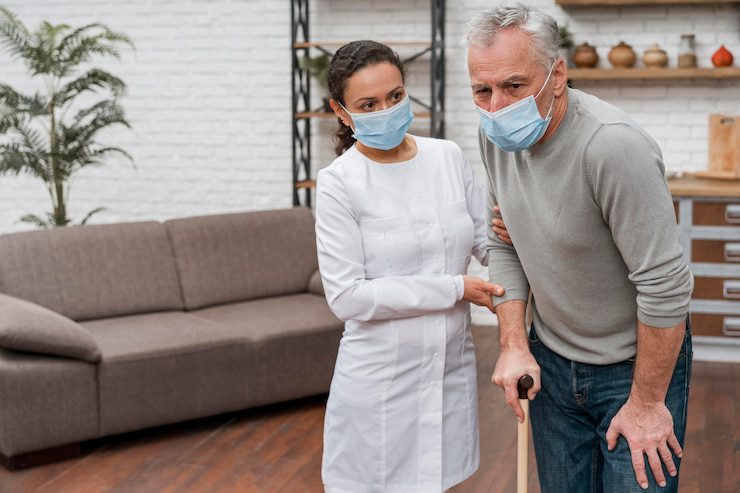Kidney Disease Care: Essential Tips for Home Management

Did you know that kidney disease is the fastest-growing noncommunicable disease in the United States? It impacts approximately 37 million Americans, about 15% of the adult population, according to the American Kidney Fund. With the rise of kidney disease, many families are turning to home care to manage their loved one’s health.
Why home care? Because kidney disease home care provides personalized support, improves daily living, and reduces hospital visits. This helps manage symptoms, offering both patients and caregivers more comfort and independence. By providing care at home, it becomes easier to stick to a kidney-friendly diet, manage medications effectively, and recognize early signs of potential issues before they become serious.
In the following sections, we will explore the common challenges faced by kidney patients and provide essential tips for daily management, ensuring that families are well-equipped to support their loved ones effectively through kidney disease care.

Common Challenges That Kidney Patients Face
One must first understand and be familiar with the common challenges patients face to provide effective home health care for seniors and individuals of all ages. Here’s the list of common challenges that kidney patients face:
- Fluid Retention
- Electrolyte Imbalances
- Changes in Urination
- Skin Changes
- High Blood Pressure
- Changes in Appetite and Taste
- Bone Health Issues
- Mental Health Challenges
- Fatigue
- Nausea and Vomiting
- Sleep Disturbances
- Anemia
- Weight Changes
- Social Isolation
Kidney Disease Home Care: Essential Tips for Daily Management
Dietary Management
- Limit Sodium Intake: High sodium levels can lead to increased blood pressure and fluid retention, significantly putting additional strain on the kidneys. As kidney function declines, particularly in seniors, their ability to filter excess sodium diminishes, which can exacerbate existing health issues. Therefore, it’s crucial to reduce sodium intake to prevent the kidneys from overworking while lowering the risk of further damage. Seniors should be especially aware of this, as they are at a higher risk for hypertension. To support kidney health, caregivers should avoid foods high in salt, such as bacon, pickles, and olives. Incorporating these dietary changes into a senior home care plan can greatly enhance overall well-being and health management.
- Adjust Protein Intake: The metabolism of protein produces urea and other waste products that the kidneys must filter out. By limiting protein intake, you reduce the amount of waste that needs to be processed, lessening the burden on the kidneys. This is important for individuals with declining kidney function, as it can slow the worsening of kidney disease. While reducing protein is important for kidney health, it’s also essential to maintain adequate nutrition. Add low-protein foods like fruits, vegetables, and grains to their diet as they can provide necessary nutrients without crushing the kidneys with waste. However, if you’re on dialysis, your kidneys no longer filter waste products from your blood, which leads to an increased need for protein. During the dialysis process, some protein is lost, so it’s essential to consume more to compensate for this loss. Also, your body requires more energy while undergoing dialysis, further increasing your protein requirements.
Hydration
When you’re caring for someone with kidney disease, keep them hydrated to support their kidney function. Water helps flush out sodium and toxins, which reduces the strain on their kidneys. So, stick to water or unsweetened, decaffeinated drinks. With the below-mentioned formula, you can estimate how much they should drink water in a day:
Fluid Intake (in ounces) = Body Weight (in pounds) ÷ 2
For example, if the person weighs 150 pounds:
150 ÷ 2 = 75 ounces of fluid per day.
If they’ve had kidney stones before, it’s even more important to keep their fluid intake up to help prevent future stones. Adjust based on how they’re feeling and what their doctor recommends.
Regular Monitoring Of Blood Pressure
Tracking blood pressure is really important because high blood pressure can cause further kidney damage. If the person also has conditions like diabetes, heart disease, or high cholesterol, the effects can be even more serious. So, regularly check out their blood pressure and aim for a healthy reading of 120/80. If you notice their readings fall between 120/80 and 139/89, that’s considered prehypertension, and this is a good time to make lifestyle and dietary changes to help bring it down. If their readings consistently go above 140/90, it’s considered high blood pressure, and you should consult a doctor about regular monitoring, possible medications, and adjustments to their routine. Keeping blood pressure under control is essential to slowing the progression of kidney disease.
Be Aware of Over-the-Counter Pills
It is important to be mindful of over-the-counter (OTC) medications, particularly pain relievers. Nonsteroidal anti-inflammatory drugs (NSAIDs) like ibuprofen and naproxen can reduce blood flow to the kidneys, which in turn decreases their ability to filter waste. Over time, this can worsen kidney function and lead to permanent damage, especially if used frequently or in high doses. For a patient with kidney disease, always check with the doctor before giving any OTC medications. They can recommend safer alternatives that won’t strain the kidneys. Managing pain carefully can help prevent further complications while ensuring their treatment remains safe and effective.
Encourage Them To Quit Smoking And Limit Their Alcohol Intake
Quitting smoking and limiting alcohol intake are crucial for supporting kidney health. Smoking damages blood vessels, reduces oxygen flow to the kidneys, and raises blood pressure, all of which worsen kidney function. On the other side, excessive drinking puts additional strain on the kidneys by increasing blood pressure and causing dehydration, which makes it harder for the kidneys to function properly. Alcohol can also interfere with medications that are prescribed for kidney disease, such as those for controlling blood pressure or blood sugar. By limiting alcohol and quitting smoking, you’re helping to prevent these complications and promoting healthier outcomes.
Conclusion
People with kidney disease have kidney damage that gets worse over time. While there’s no cure, there are self-care steps that we have mentioned, such as changes in diet, reducing alcohol, quitting smoking, and many more. These can help manage symptoms and slow the disease’s progression. Whether you are providing in-home senior care to your elderly or caring for any other individual in your family suffering from kidney disease, you can follow these tips for anyone dealing with kidney disease. If you don’t have time to take care of the patient but want them to be at home, you can hire Family Ties Home Care LLC. Our highly trained caregivers provide compassionate and comprehensive care to individuals seeking personal in-home care.
